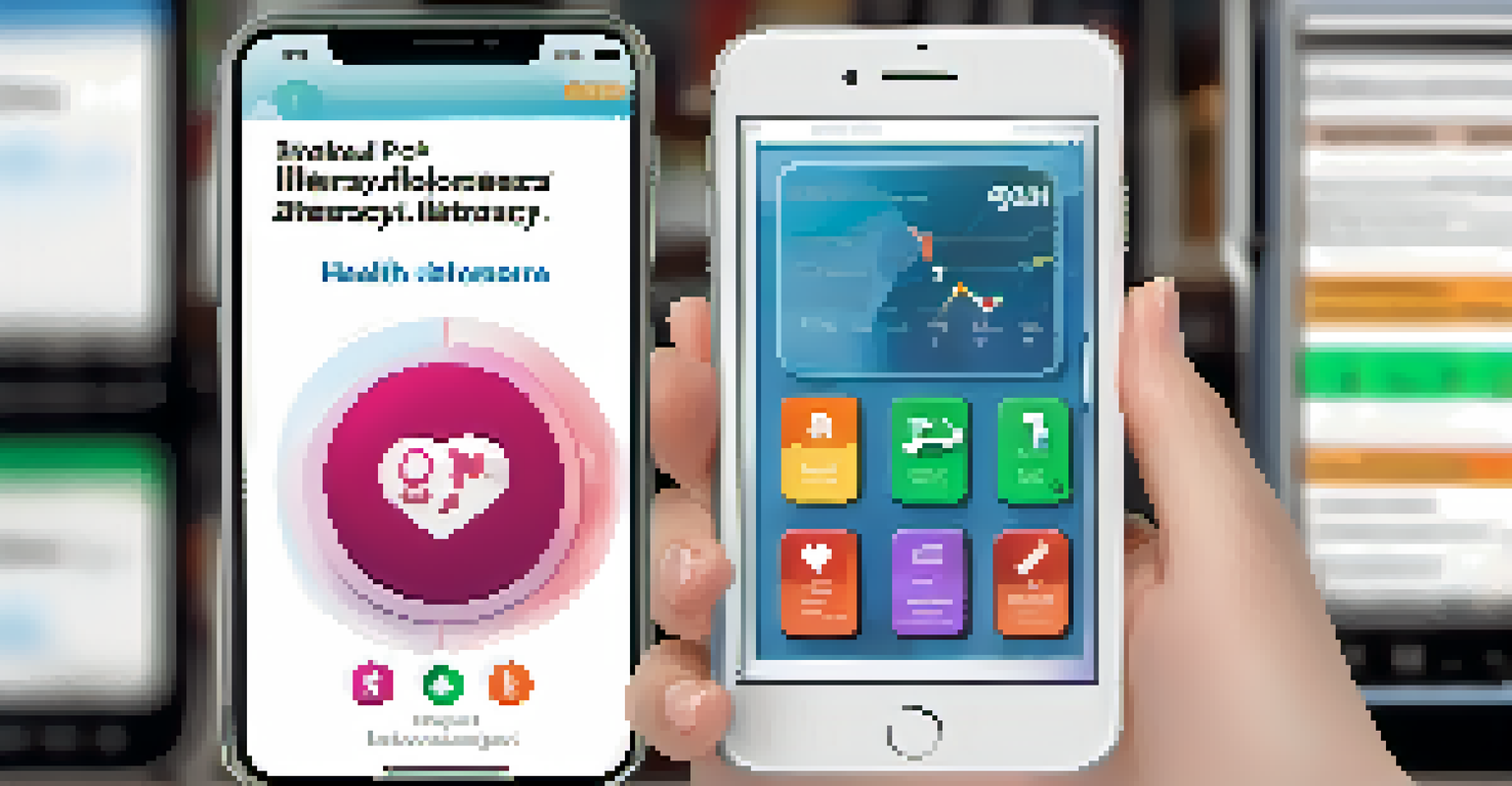The Importance of Empathy in Health Literacy Education

Understanding Health Literacy and Its Challenges
Health literacy refers to the ability to obtain, process, and understand basic health information. It's essential for making informed health decisions, yet many individuals struggle with it due to various factors like language barriers or low education levels. Essentially, when someone lacks health literacy, they may misunderstand medical instructions or avoid seeking care altogether, leading to poorer health outcomes.
Health literacy is not just about reading and writing; it’s about understanding and making informed decisions about your health.
Empathy plays a vital role in addressing these challenges. By recognizing the struggles individuals face, healthcare providers can tailor their communication strategies to meet patients' unique needs. For instance, using simple language or visual aids can help bridge the gap, ensuring that everyone comprehends their health information.
Moreover, fostering an empathetic environment encourages patients to ask questions and voice their concerns. When patients feel understood and supported, they are more likely to engage in their health management, leading to better adherence to treatment and improved overall health.
The Empathy-Health Literacy Connection
Empathy and health literacy are intertwined; one enhances the other. When healthcare professionals demonstrate empathy, they create a safe space for individuals to communicate openly about their health concerns. This two-way communication is crucial for assessing a patient's understanding and addressing any misconceptions they may have.

For example, a doctor who listens actively to a patient’s worries can identify gaps in their health knowledge. By addressing these gaps with compassion, the doctor empowers the patient to take charge of their health, significantly improving their health literacy. This empowerment can lead to increased confidence in managing personal health.
Empathy Boosts Health Literacy
Healthcare providers who demonstrate empathy significantly enhance patients' understanding and management of their health.
In essence, when empathy is prioritized in health literacy education, it transforms the educational experience. Patients don’t just receive information; they understand it, which helps them make better choices regarding their health and well-being.
Training Healthcare Providers in Empathy
To foster empathy in healthcare, training programs for providers are essential. These programs should focus on active listening, emotional intelligence, and effective communication techniques. By equipping healthcare professionals with these skills, we can improve their interactions with patients and enhance overall health literacy.
Empathy is about finding echoes of another person in yourself.
For instance, role-playing scenarios can help providers practice responding empathetically to a variety of patient concerns. This hands-on approach not only builds confidence but also encourages a deeper understanding of the diverse backgrounds and experiences of patients.
Investing in empathy training can yield significant dividends. When providers exhibit genuine care and understanding, patients feel more valued and respected, leading to better health outcomes and stronger provider-patient relationships.
Empathy in Community Health Initiatives
Community health initiatives play a crucial role in promoting health literacy, and empathy is at the heart of their success. By understanding the cultural and social contexts of the communities they serve, organizations can design programs that resonate with individuals. This tailored approach helps ensure that health messages are not only heard but also understood.
For example, a community health worker who empathizes with the challenges faced by a low-income family can provide relevant resources and information. This personalized support can bridge the gap between healthcare systems and the community, fostering trust and improving health literacy.
Training Empathy in Healthcare
Effective training programs for healthcare providers focus on empathy, improving their interactions and fostering better patient outcomes.
Ultimately, incorporating empathy into community health initiatives leads to more effective outreach and education. When people feel that their experiences are acknowledged and validated, they are more likely to engage with health resources and make informed decisions.
The Role of Technology in Fostering Empathy
In today's digital age, technology can be a powerful tool for fostering empathy in health literacy education. Telehealth, for example, allows healthcare providers to connect with patients remotely, making healthcare more accessible. However, it’s crucial that these digital interactions maintain a human touch to ensure empathy isn’t lost.
Interactive platforms and mobile applications designed to promote health literacy can also incorporate empathetic communication techniques. Features such as personalized health reminders or educational videos that address common patient concerns can help individuals feel supported in their health journeys.
By leveraging technology with empathy-driven approaches, we can create a more inclusive healthcare environment. This combination not only enhances health literacy but also encourages individuals to take an active role in managing their health.
Empathy's Impact on Patient Outcomes
The influence of empathy on patient outcomes cannot be overstated. Numerous studies have shown that when healthcare providers practice empathy, patients report higher satisfaction levels and better adherence to treatment plans. This is because patients who feel understood are more likely to follow medical advice and engage in their health management.
For instance, a patient who feels comfortable discussing their symptoms with a compassionate provider may be more inclined to seek regular check-ups and follow prescribed treatments. This proactive approach can lead to early detection of health issues and better overall health outcomes.
Technology Enables Empathetic Care
Leveraging technology with a focus on empathy creates more accessible healthcare and improves health literacy among patients.
In the long run, fostering empathy in healthcare not only benefits individual patients but also contributes to healthier communities. When patients feel empowered and informed, they are more likely to share their knowledge and experiences with others, creating a ripple effect of improved health literacy.
Strategies for Enhancing Empathy in Health Literacy Education
To effectively enhance empathy in health literacy education, several strategies can be implemented. First, incorporating patient stories and testimonials into educational materials can humanize health information. These narratives help learners relate to real-life experiences, making the content more engaging and impactful.
Secondly, encouraging collaborative learning environments can foster empathy among healthcare providers and patients. Workshops that promote discussion and sharing of perspectives can help build understanding and compassion, ultimately improving communication.

Lastly, ongoing evaluation and feedback mechanisms can help healthcare organizations assess the effectiveness of their empathy initiatives. By continuously refining their approach based on patient feedback, they can create a more empathetic healthcare landscape that prioritizes health literacy.